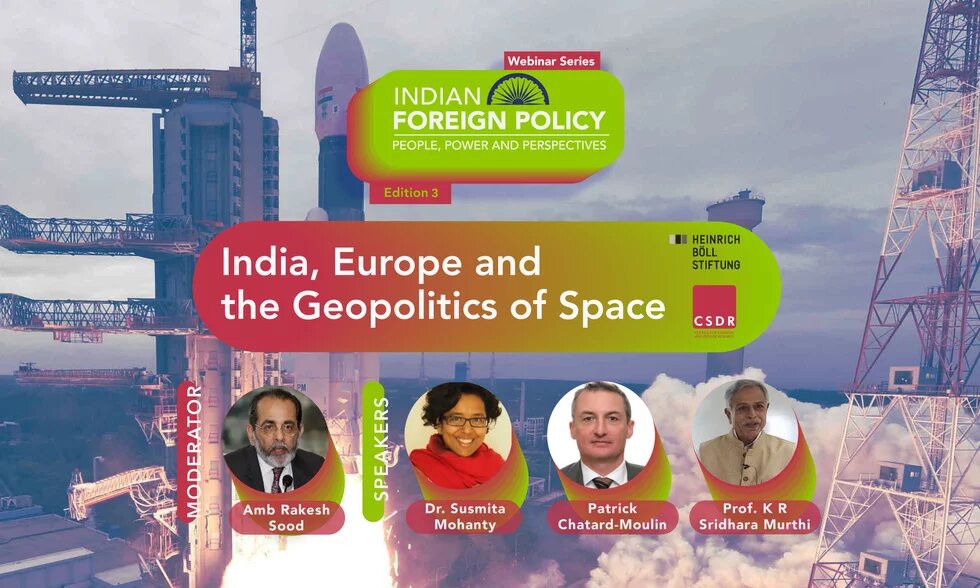India and Europe explore new frontiers in space collaboration, navigating geopolitics, governance, and innovation in a rapidly evolving cosmic arena.

The success of India’s Chandrayaan-3 mission that landed a rover near the lunar South Pole in August 2023 has generated significant international interest in the technical prowess of the Indian Space Research Organisation (ISRO) and the country’s geopolitical ambitions in the increasingly contested lunar environment. Against this backdrop, this webinar discussed India’s evolving space programme, highlighting its current capabilities and future aspirations, while also exploring potential avenues for India-EU collaboration in space exploration, security, and governance.
- India's 2024 space budget of about €1.4 billion, while trailing major space-faring countries, is amongst the highest globally and surpasses that of players like Italy and Germany (just under €1 billion) – indicating India’s clear political commitment to the space sector.
- Since 2020, India’s space sector has experienced remarkable growth, driven by government reforms and the liberalisation of the industry. Numerous technologically advanced startups are making significant strides in areas such as rocket development, satellites, nanotechnology, and green propulsion. However, to realise India’s full potential, further liberalisation of the space sector will be essential.
- India urgently needs a National Space Law to attract foreign direct investments (FDI). It also needs to develop areas like space insurance to advance the space economy and provide a clear regulatory framework for private sector participation.
- India’s long-standing focus on technological independence in managing space assets for socio-economic development, resource management, communication, and navigation is now complemented by ever more ambitious targets - such as crewed space missions and the establishment of its own space station - to establish itself as a leading global space power. To achieve this, India is focused on its established approaches, building autonomous access capabilities and cost-effective systems, while leveraging its growing private sector.
- The EU, once primarily focused on space as a realm for business and scientific exploration, increasingly regards it as a strategic priority. This shift is driven by the increasing dependence on space-based services for societal and economic needs, coupled with the rising threats to these vital services. The European focus on a unified defense strategy prompted by the Ukraine invasion now also extends to space defense mechanisms, including efforts to protect satellite infrastructure. The EU is currently working on establishing a space law that addresses safety, sustainability, and environmental concerns in space.
- The ISRO has over 60 MoUs with European countries, with France being the most active partner. Indo-French space cooperation has been a success story – beginning with rocket engines and now extending to launch vehicles, propulsion systems, and reusable technologies.
- The EU's Horizon 2020 grant providing support for startups in the space sector, currently exclusive to European companies, has potential as an instrument to enhance collaboration between the Indian and European private sector. Ongoing India-EU dialogues could explore ways to extend the grant's benefits to Indian startups, promoting deeper cooperation in the space domain.
- The governance of space has become a critical issue, with growing concerns about the militarisation of space by defense agencies. This raises the question of whether space can be transformed into a "global public good" through international cooperation.
- Governance challenges, like the need for binding laws, clear operational rules, and management of space traffic, have proved persistent. Both India and the EU are focused on preventing an arms race in space and collaborating to bring about global governance in space, including efforts to establish norms for responsible behavior in space.
- A convergence of powers is essential for meaningful space-related talks, but major global players have yet to align on this issue. Middle-power coalitions, like those of India and Europe, could offer a fresh perspective and impetus, by promoting multilateral initiatives and fostering consensus on key issues.
- As private sector participation continues to expand globally, it is imperative to establish common ground on space laws. While ultimate decision-making authority should reside with governments, a key question emerges: will these increasingly influential private actors adhere to national regulations in a manner akin to compliance with international treaties, such as the Chemical Weapons Convention, once ratified by their respective countries?
The views and analysis contained in this summary are those of the speakers and do not necessarily represent the views of the event organisers.
This discussion is part of The Indian Foreign Policy Webinar Series, offering an insightful and comprehensive examination of the emerging trends and strategic recalibrations defining India's role in the world today. For more information and to explore upcoming sessions, click here.


